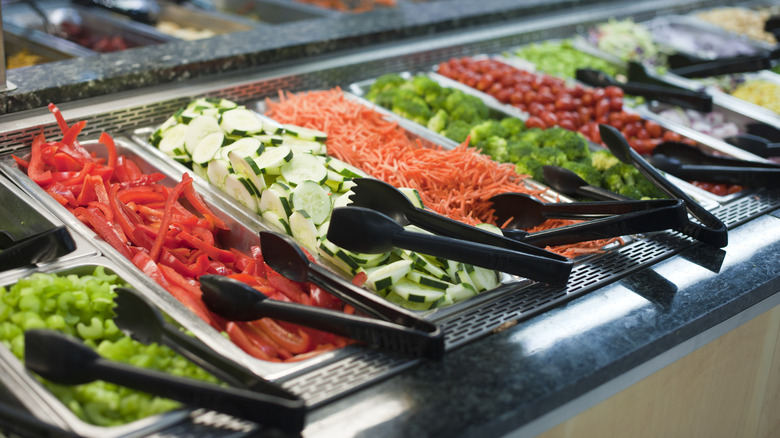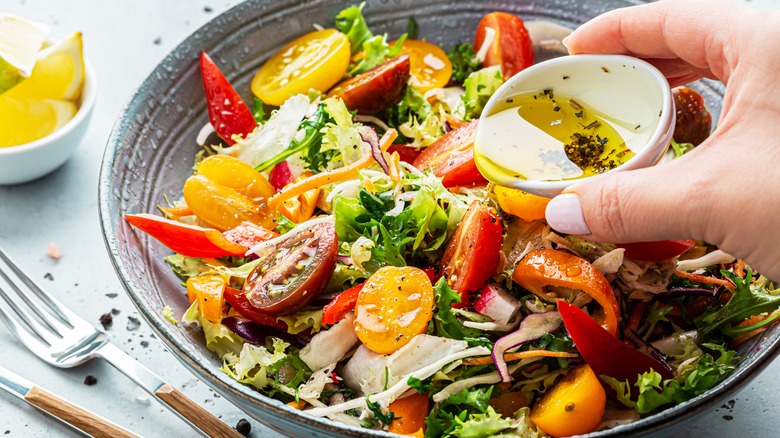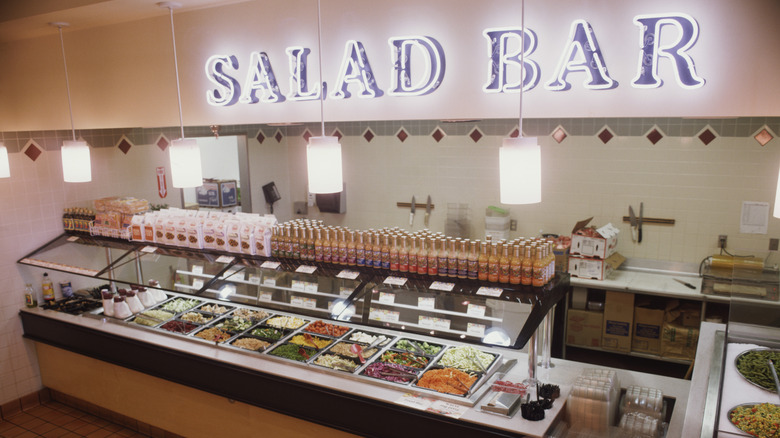Why It's Bad Etiquette To Clean Up Spills At A Salad Bar
It's not always enough to have good intentions, at least if you're also concerned with observing proper etiquette. Often, it's the things we don't know that lead to breaches in good conduct. The salad bar, for example, like fast food drive-thrus or fancy restaurants, has rules of etiquette that are all its own. Thus, something as innocuous as using the same plate on multiple occasions — perfectly appropriate in one's own home — is actually frowned upon in this context for sanitary reasons.
Cleaning up one's own spills is also a salad bar etiquette no-no. Why? Again, it's a hygienic issue. Food hygiene, of course, is important in any restaurant setting, but it's particularly crucial when it comes to buffet areas like salad bars, where bacterial cross-contamination is a possibility. As a consequence, most restaurants with salad bars have very specific guidelines about servicing them, from keeping food at the right temperature to rules regarding the sanitizing of utensils. Spills, too, are subject to very strict protocols. So while it seems as though cleaning up a mess that you caused is the right thing to do, in salad bars it's actually an etiquette violation.
The proper course of action, in this case, is to notify waitstaff, so they can have it cleaned up according to the restaurant's policy guidelines.
The basis for salad bar etiquette
Cleaning up salad bar spills is definitely bad etiquette due to restaurant hygienic policies. This should come as good news, as it means salad bar aficionados are no longer responsible for any spills they may cause while building and dressing their salads. Once they've alerted restaurant personnel about their boo-boos, they can simply return to their tables to enjoy the fruits (and veggies) of their labor. It's also good news for restaurant staff, who'd prefer to handle the cleaning themselves.
The truth is that almost all etiquette in this regard is based on sanitary considerations. It's why you shouldn't pick up multiple items with the same utensil. These actions, like the incorrect cleaning of spills, can contribute to potential cross-contamination, and ultimately to food poisoning. Sadly, these behaviors are distressingly common.
A few decades ago, for example, researchers at the University of California, Davis released findings from a study of almost 400 salad bar users (via Orlando Sentinel). The results were predictable, but shocking nonetheless. A whopping 60% of those who went through salad bars committed basic breaches of safety; with improper spill cleaning, touching food with fingers rather than tongs, and utter disregard for the protective sneeze guards among the most common infractions.
Salad bar safety drives etiquette rules
Bacterial cross-contamination and accidental exposure to allergens are very real issues that can occur at salad bars if patrons aren't careful. Nuts and milk are among the most common food allergies, and numerous examples from each category can be found at typical salad bars, from almonds and walnuts to blue cheese and Caesar dressings.
Restaurants with salad bars try to mitigate against these dangers as much as possible, of course, not only by training their staff to properly clean and maintain these stations, and to remove food when it has been out too long, but also by setting up salad bars so that patrons can easily use them safely. That's why every food item has its own set of tongs or utensils nearby, and why they're so frequently cleaned and sanitized.
As a consequence of this attentiveness on the part of restaurant staff, most salad bars are very safe. In order to ensure this remains the case, however, salad bar etiquette has been codified over time to reflect and reinforce existing safety guidelines. So next time you spill a few nuts or inadvertently drizzle some dressing into a container of romaine lettuce at a local salad bar, don't try to clean it up yourself. Alert waitstaff instead. It's not only the polite thing to do, it's the right thing to do, too.



